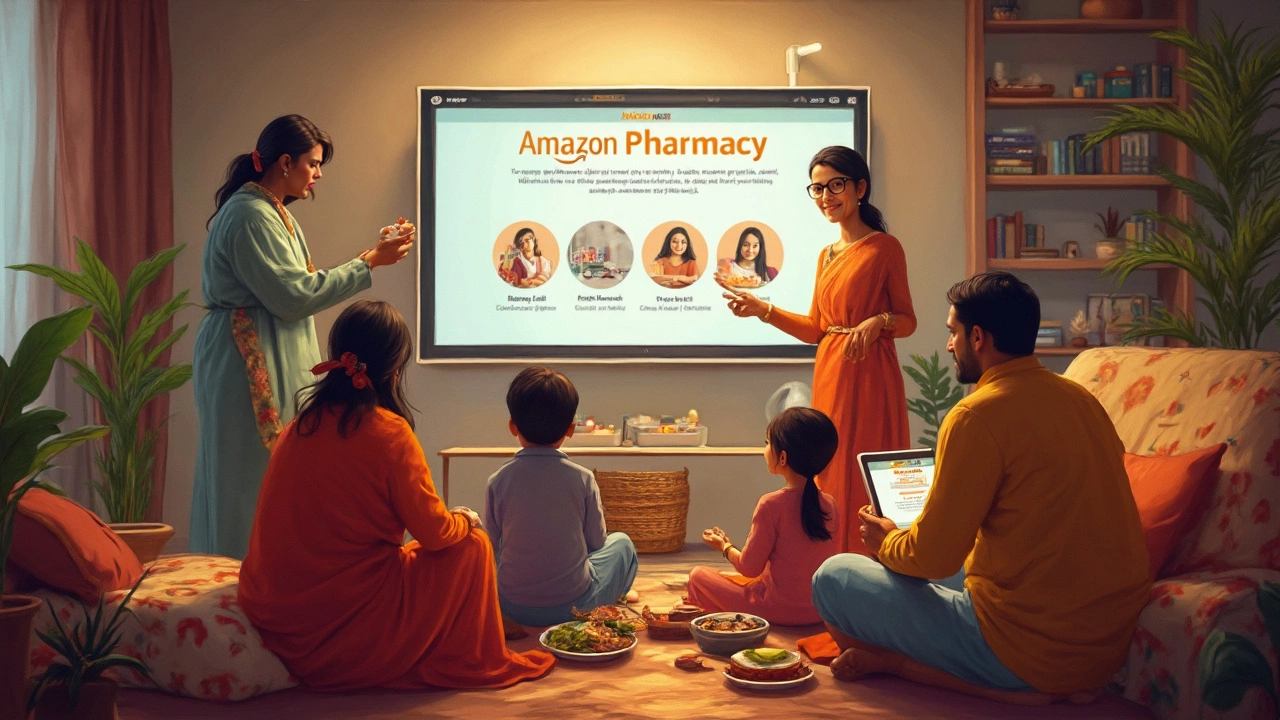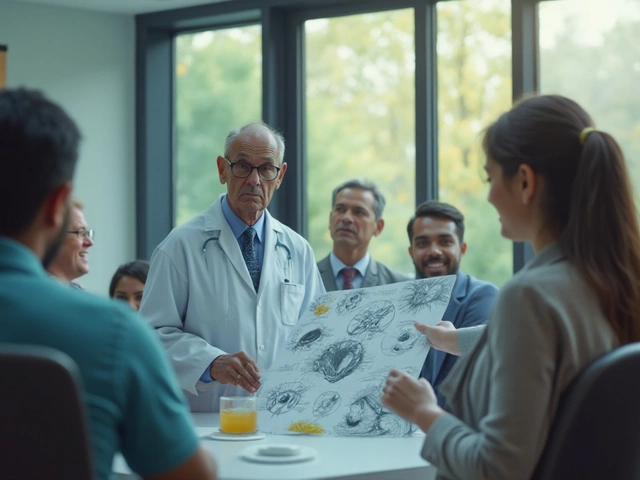So, imagine this: you're out of your regular medication, and instead of making that tiresome trip to the pharmacy, you can order it online, just like you would a book or some groceries. Yep, enter Amazon Pharmacy, the tech giant's venture into the world of healthcare. It's convenient, sleek, and might just save you a lot of time.
But hang on a second—what if the medication you need falls under the 'controlled substances' category? These aren’t just your everyday pills; we're talking about stronger stuff, like opioids or certain anxiety meds that need a bit more oversight. Can Amazon Pharmacy handle these prescriptions too? That's where things get a little more complex.
Controlled substances have a bunch of rules around them, thanks to their potential for misuse. So, while Amazon Pharmacy is a game changer, it's vital to know what they can and can't do. Right now, they offer a wide range of medications, but when it comes to controlled substances, things aren't as straightforward as adding it to your virtual cart.
- Amazon Pharmacy Overview
- What Are Controlled Substances?
- Regulations Surrounding Controlled Substances
- Amazon's Current Capabilities
- Future of Online Pharmacies and Controlled Substances
Amazon Pharmacy Overview
Alright, so Amazon Pharmacy is part of Amazon's grand plan to basically have everything in one place. Launched in late 2020, it's their way of throwing their hat into the online prescription game. They promise a more streamlined way to get your meds without having to step foot in a store, which is a big win for those who value convenience over everything else.
Here's how it works: you have to create an account on Amazon, upload your prescriptions, and boom, you can have them delivered right to your doorstep. It's not just about convenience, though. They aim to make it more affordable too, especially for Prime members who get added perks, like discounts.
Now, Amazon doesn’t just throw pills in a box willy-nilly. They have licensed pharmacists involved to ensure everything's above board. But it really gets interesting when we talk regulations. Amazon Pharmacy complies with state and federal laws regarding prescription meds, which means they’re playing by the same rules as your local pharmacy.
"Amazon Pharmacy is an innovative offering that makes it easier for customers to purchase prescription medications online," said a representative from Amazon in a press release when they launched the service.
Oh, and it's not limited to just the usual over-the-counter stuff. They offer a whole slew of prescription medications. But, you've probably guessed it, they run into tricky waters with controlled substances—more on that later.
Here's a quick look at what they offer:
- Competitive pricing for prescription meds, especially for Prime members.
- Access to pharmacists via online or phone communication.
- Services accessible through both mobile and desktop platforms.
For those wondering if their specific meds are covered, Amazon Pharmacy's website has a handy search tool. Convenience meets healthcare, but it's not a free-for-all. The journey to include controlled drugs is ongoing, keeping things interesting in the world of online pharmacies.
What Are Controlled Substances?
Okay, picture this: Controlled substances are like the VIP section of the medication world, but with way more rules. They're drugs that, while super helpful for certain medical conditions, have a higher chance of being misused or leading to dependency. And because of that, they’re heavily regulated.
Now, we're not just talking about recreational drugs here. Controlled substances include a lot of the meds your doctor might prescribe you. Think painkillers like oxycodone, stimulants for ADHD, or anti-anxiety meds like diazepam. These aren’t your over-the-counter headache pills; they need a prescription for access.
In the UK, controlled substances are split into five 'schedules,' which range from the most to least strict. Schedule 1 drugs are really restricted with no accepted medical use—stuff like LSD or ecstasy. Meanwhile, Schedule 2 includes those powerful painkillers and are tightly monitored.
Here's a quick rundown of why they're controlled:
- Potential for abuse: Some of these drugs can be addictive, hence strict control.
- Medical use: They’re usually prescribed for specific, serious health issues.
- Safety concerns: Regulatory bodies want to ensure they’re used correctly to prevent harm.
We’re talking serious business here; safety and proper use of these drugs is key. Whether it’s rules for how they can be prescribed or stored, controlled substances are tightly watched to keep everyone safe.
Just to give you some perspective, in 2023, a report showed that prescriptions for controlled substances accounted for about 11% of all medications in the UK. This number highlights the significant role they play in healthcare, despite their risks.
Understanding controlled substances is crucial when exploring options like Amazon Pharmacy, where regulations shape what’s possible in the digital space of medication delivery.

Regulations Surrounding Controlled Substances
Alright, let's unpack what it means for something to be a 'controlled substance.' These are drugs that have a high potential for misuse and dependence, which is why they come with strict rules. Think of it like giving a teenager a set curfew after a party—it's about managing risks.
In the United States, the Drug Enforcement Administration (DEA) is the big boss here. They've classified drugs into schedules from I to V, based on things like their potential for abuse and accepted medical use. Schedule I substances are the most restricted, like LSD and heroin, which aren’t typically part of medical prescriptions. Most prescription medications fall within Schedules II to V.
So how does this play out for Amazon Pharmacy or any other online pharmacy? Well, anyone handling these medications needs a specific DEA certification. Plus, pharmacies must adhere to the Ryan Haight Online Pharmacy Consumer Protection Act. This means they can't just fill prescriptions without a proper process in place—like verifying the prescription is legit and issued by a licensed practitioner.
The United Kingdom has its set of rules too, under the Misuse of Drugs Act 1971, categorizing controlled substances into Classes A, B, and C. The National Health Service (NHS) tightly controls how these drugs are prescribed and dispensed, and online platforms must play by these rules as well.
Now, there’s talk in the industry about making these rules even more integrated with digital platforms. Until then, it's crucial for users and prescribers to stay on top of current regulations to avoid any legal hiccups and ensure the medications are used correctly.
Amazon's Current Capabilities
Right now, Amazon Pharmacy is bustling with activity, handing out prescriptions just like your local chemist but online. Sounds pretty modern, right? But things get a bit tricky when it comes to controlled substances. So, what can they handle at the moment?
Amazon Pharmacy provides a wide range of medications, including everyday prescriptions for chronic conditions like high blood pressure or diabetes. They even dish out some over-the-counter products if you need a quick fix for a sore throat or a cold. But when it comes to those strictly regulated medications, like certain painkillers or anxiety meds, the process isn't as simple.
Here's the scoop: as of now, Amazon Pharmacy is working within the bounds of federal and state laws, which means they can't currently fulfill prescriptions for Schedule II controlled substances—think opioid pain meds like oxycodone. However, they do handle some lower-tier controlled substances, specifically Schedule III through V meds, which include certain ADHD medications and cough preparations with a bit of codeine.
This setup might seem limiting, but it’s actually all about safety and ensuring that these powerful medications are handled correctly. With the potential for abuse, regulations are strict, and Amazon is playing it safe, ensuring compliance with the law.
So, while Amazon Pharmacy is helping to reshape the pharmacy experience with its online convenience, when it comes to filling all types of controlled substances, they’re still following the rules—and rightly so. If you're wondering if your specific medication can be filled, it's best to check directly through their site or talk to a healthcare provider.

Future of Online Pharmacies and Controlled Substances
As technology keeps storming ahead, the digital approach to healthcare is reshaping our medicine cabinets and our lives. But when it comes to getting controlled substances online, we're still in a bit of a gray area. So, what's in store for the future?
One thing's for sure—Amazon Pharmacy is pushing boundaries in the online pharmacy scene. They're continuously looking for ways to streamline drug deliveries while ensuring safety and compliance. But when dealing with controlled substances, they need to jump through some serious regulatory hoops. Laws around these substances are strict for a reason, and rightfully so. Safety first, right?
In the coming years, we might see a few things happening. First off, there could be better, more reliable systems for prescriptions. Imagine if doctors had the tech to securely approve these prescriptions digitally, making the whole process faster and safer. And let's be real, who wouldn't appreciate a little more convenience?
Then there's the potential for enhanced tracking systems. Keeping tabs on where and how medications are being used could help prevent misuse. Advanced AI and data analytics could play a massive role here.
Furthermore, collaborations between tech companies and regulatory bodies might pave the way for online pharmacies to widen their reach. It's not just about the prescription medications anymore—it's about merging healthcare with technology responsibly.
Of course, a big part of this is public trust. For online pharmacies to handle controlled substances, they need to prove they're as reliable, if not more so, than your local drugstore.
Ultimately, the future of online pharmacies like Amazon could hold a balanced combo of tech innovation and regulatory compliance. It's about making life easier without compromising safety.





